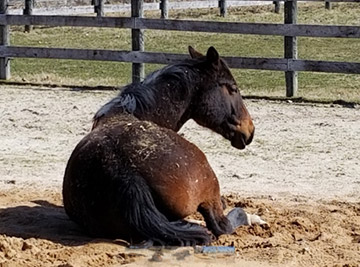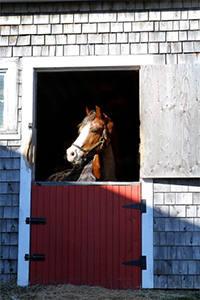Coronavirus in Horses
By: Dr. Lydia Gray, SmartPak Medical Director/Staff Veterinarian
Updated 4/6/2020
Overview
The equine coronavirus (ECoV) that infects horses is not the same as the COVID-19 that infects people. Equine coronavirus mainly causes gastrointestinal (GI) disease, not respiratory disease, and is spread by contaminated manure as well as items and surfaces that come into contact with contaminated manure. At this time, there is no evidence to suggest that horses can contract COVID-19.
This article explains the difference between ECoV and COVID-19, lists the signs and symptoms of horses with the disease, describes how veterinarians diagnose and treat equine coronavirus, and last but not least provides tips and techniques for preventing equine coronavirus outbreaks in barns.
What is Equine Coronavirus and How is It Different from COVID-19?
ECoV is a fairly recently recognized GI disease in horses caused by a coronavirus strain specific to equines. Although highly contagious with the potential for outbreaks, most horses that get infected (75-80%) do not show any signs or symptoms. Those that do become ill often get better on their own or with basic nursing care. There is a test to diagnose equine coronavirus using a fecal sample, but no specific treatment is available at this time.
COVID-19 stands for COronaVIrus Disease-2019 and is a brand new or “novel” coronavirus affecting people. It is spread by respiratory droplets in the air and causes mainly respiratory signs in some but not all people who are exposed. It is also possible that contaminated items and surfaces might be another source of spread of the virus.

What are the Signs and Symptoms of Equine Coronavirus?
Although not all horses exposed to ECoV become sick (only about 20-25%), the most common signs for those that do develop illness include:
- Laying down frequently
- Lack of appetite
- Lethargy (acting dull or depressed)
- Fever (temp over 101°)
- Soft, watery stool
- Colic
Owners should contact their veterinarian right away if they notice any of these signs that their horse is not acting or feeling normal. This way, the vet can determine if equine coronavirus is the source of the illness or if another, potentially more serious GI disease -- such as Salmonella -- is the cause, which can be spread to people. While there is no specific treatment for ECoV, other causes of fever, loose stool, and colic in horses may be treatable and generally the sooner the vet can start appropriate therapy, the better the outcome and the fewer the complications.

How is Equine Coronavirus Diagnosed and Treated?
Veterinarians reach a diagnosis of equine coronavirus by taking into account the horse’s history and clinical signs, changes in general bloodwork, and test results that may specifically rule in equine coronavirus or rule out other causes of similar signs and symptoms. The test for ECoV detects genetic material of the virus in fecal samples and takes about three business days. Keep in mind that horses can test negative during the very early stages of disease as shedding of the virus in manure peaks 3-4 days after clinical signs appear.
Fortunately, equine coronavirus is a self-limiting disease in most cases. That is, it runs its course and most horses recover uneventfully in several days to a week even without treatment. When intervention does seem necessary, it is generally limited to basic supportive care such as fluids, nonsteroidal anti-inflammatory drugs (NSAIDs), and treatment of secondary infections or complications since there is no specific treatment for ECoV.
One of the most important steps in treating an equine coronavirus patient is isolating the horse and following barn biosecurity practices, due to the contagious nature of the disease. Examples include having only one person provide the horse’s daily care and using dedicated handling, feeding, and cleaning equipment.

How Can You Prevent Equine Coronavirus?
At this time, there is no vaccine for ECoV. Therefore, the best way to prevent an infection is to make it a habit to quarantine horses entering the property, isolate sick horses, and practice good stable hygiene. Together, these management practices are considered biosecurity for horse facilities.
For a disease like equine coronavirus that is spread by contaminated manure, particular attention should be paid to stall cleaning procedures, equipment handling, and manure disposal. If it is not possible to designate one person to clean the stalls of any horses in isolation, using separate tools and equipment, then personnel should clean the stalls of healthy horses first, before those being observed in quarantine, followed by any sick horses under isolation last. Manure should be considered contaminated and disposed of carefully so that it, and the tools, equipment, and even personnel handling it do not spread the disease.
Summary
Equine coronavirus or ECoV is a newly recognized, highly contagious viral disease that can cause mild to moderate gastrointestinal signs in horses. It is a different coronavirus than the ones that cause disease in humans – such as COVID-19 – and there is no evidence at this time to suggest horses can contract COVID-19. Owners should contact a veterinarian right away when a horse loses his appetite, develops diarrhea, or has a fever, so that an accurate diagnosis can be obtained, appropriate treatment started, and measures to prevent spread of the disease put in place.
The Equine Disease Communication Center or EDCC provides additional detail about equine coronavirus and other infectious disease in horses, as well as more tips on preventing the spread of disease among horses and barns on their website: www.equinediseasecc.org/biosecurity.
SmartPak strongly encourages you to consult your veterinarian regarding specific questions about your horse's health. This information is not intended to diagnose or treat any disease, and is purely educational.
Article First Published 4/6/2020